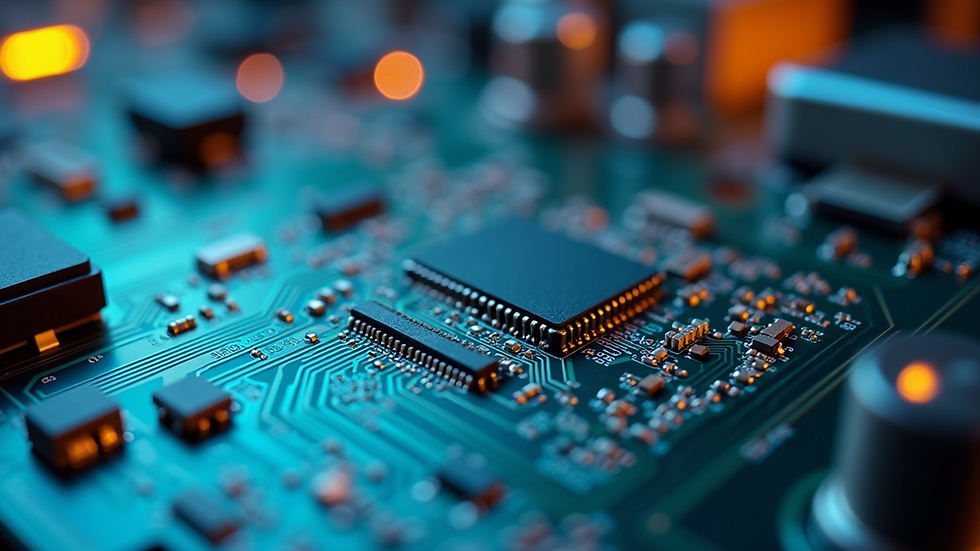Exploring the Impact of AI on PCB Design A Case Study of Xelec's In-House AI Implementation
- Gulshan Sharma
- Jul 22, 2025
- 4 min read
In recent years, artificial intelligence (AI) has begun to change the game in many industries, including electronics and printed circuit board (PCB) design. The introduction of AI technologies into PCB workflows has led to faster prototyping, improved design capabilities, and more efficient component selection. This blog post highlights the successful implementation of an in-house AI agent at Xelec, designed to select components and automate code writing for a specific client project. By fine-tuning an open-source model specifically for electronics hardware and firmware, Xelec achieved a new milestone in PCB design efficiency.
The Challenge: Traditional PCB Design Approaches
Historically, PCB design is a labor-intensive and time-consuming process reliant on human expertise. Designers often spend dozens of hours selecting components, writing code, and ensuring designs meet various industry standards. As projects have grown more complex, deadlines have tightened, and client expectations have soared, it became clear that more efficient methods were needed.
Xelec identified significant drawbacks in traditional PCB design methods. Human constraints, such as fatigue, knowledge gaps in the latest component offerings, and the slow coding process, hampered progress. To tackle these challenges, Xelec sought to leverage AI technology, streamline workflows, and deliver high-quality designs to clients more quickly and consistently.

Developing the AI Agent
Xelec embarked on developing a proprietary AI agent tailored to the unique needs of PCB design. The aim was to create a tool capable of analyzing project requirements, suggesting suitable components, and automating relevant code generation.
To achieve this, the team selected an open-source model, which offered flexibility and customization. Through supervised learning, the model was refined with extensive design data and client feedback, ensuring high accuracy in both component selection and code generation.
One major hurdle faced was gathering a robust dataset for training the AI agent. The engineering team collaborated with domain experts, gathering relevant data from over 200 existing projects and best practices. This comprehensive dataset enabled the agent to make informed decisions based on the latest components and design strategies.
Implementation in Client Projects
With the AI agent fully developed, Xelec applied it to a challenging client project necessitating a sophisticated PCB design for a cutting-edge consumer electronic device. This device required high performance, low power consumption, and a compact design, making precise component selection and coding critical.
Using the AI agent, Xelec's engineers were able to input the design requirements swiftly. The AI analyzed key parameters, such as power needs, signal types, and component specifications. For instance, it suggested components with a 95% compatibility rate, expediting the selection process while providing insights on performance trade-offs.
Moreover, the AI agent automated parts of the coding process. It generated firmware that seamlessly controlled PCB functions by considering user feedback. This automation allowed engineers to concentrate on more strategic design elements and optimization, resulting in a 30% reduction in coding time.
Results and Benefits
The implementation of the AI agent yielded impressive results. The time required to complete the PCB design was cut by approximately 40%, enabling Xelec to meet tight deadlines without sacrificing quality. Additionally, the accuracy of component selection improved overwhelmingly—reducing errors associated with the manual process by about 50%.
Collaboration among team members also flourished, as engineers utilized AI recommendations to enhance discussion and decision-making. This synergy between human insight and AI capabilities created a responsive workflow that optimized design processes while promoting innovation.
Importantly, Xelec delivered the final product to the client ahead of schedule. This achievement not only increased client satisfaction but also positioned Xelec as a leader in integrating AI technologies within the PCB design sector. The effective implementation of the AI agent showed that AI can significantly alter how electronics are conceived and created.
Looking Ahead: The Future of AI in PCB Design
Xelec's experience illustrates a growing trend in the electronics industry. The increasing recognition of AI's potential promises more efficient and innovative PCB design in the near future.
Future implementations may take advantage of machine learning algorithms that adapt from new projects and data inputs, resulting in ever-more sophisticated tools. Additionally, AI could enable more automated PCB prototyping and testing, accelerating product development cycles significantly.
As expertise in-house grows and AI becomes even more integral to PCB design, companies like Xelec will be better prepared to address the rapidly changing demands of the electronics market. The emphasis on collaboration between engineers and AI agents is likely to redefine design practices, paving the way for transformative advancements in the field.
A Forward-Looking Perspective
The successful implementation of Xelec's in-house AI agent has not only enhanced PCB design efficiency but also restructured workflows and collaboration within the engineering team. This case study exemplifies the impact of AI technologies on the electronics industry, showcasing how automation can complement human expertise for superior outcomes.

As AI continues to evolve, organizations must stay agile and innovative in their design processes to harness the full potential of technology. Embracing AI is fast becoming a crucial strategy for success in today's competitive landscape.
Join our exclusive community and get multiple benefits, including early access to our beta AI solutions for this industry - https://forms.gle/igbhGxChxkXCiMqKA
For end-to-end electronics development and manufacturing services - Hardware Development, Firmware Development, Rapid Prototyping, BOM procurement, PCB fabrication and assembly, Turnkey Manufacturing, please get in touch - gulshan@xelec.in




Thank you for sharing.
Bay Area Circuits provides professional full turn-key PCB services to manage every stage of circuit board production. From component sourcing and fabrication to assembly and testing, each step is handled carefully to ensure accuracy and reliable performance. These services help engineers, startups, and manufacturers save time, reduce errors, and maintain consistent quality throughout the project. Proper management of all stages supports smooth assembly and functional boards ready for deployment. Get your electronics projects completed quickly and effectively—contact Bay Area Circuits today!